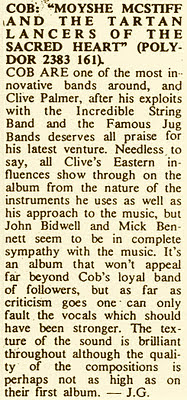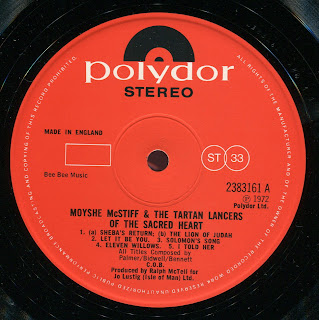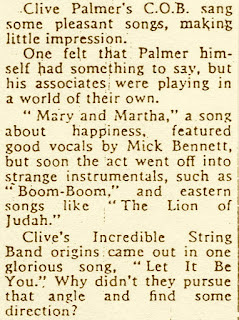 |
| Clive Palmer, Mick Bennett, John Bidwell and Genevieve Val Baker |
 Following the release of Spirit Of Love in November 1971, COB played a few gigs, but largely focused on getting a new set of songs together back in Cornwall. They added Genevieve Val Baker (whose sister Demelza had played with Palmer and Bidwell in the Temple Creatures) on drums and percussion, and by July 1971 they had a single ready for release. Produced by Ralph McTell, Blue Morning / Bones appeared on Polydor, following the dissolution of their manager Jo Lustig's arrangement with CBS. Lustig had apparently instructed them to come up with something deliberately commercial, and the result is a good-natured pop record that sounds little like the rest of their work. The A-side verges on reggae, and the flip is almost a novelty song. It's an anomaly in their catalogue, and seems to have baffled Rosalind Russell when she interviewed them for Disc on July 29th 1972:
Following the release of Spirit Of Love in November 1971, COB played a few gigs, but largely focused on getting a new set of songs together back in Cornwall. They added Genevieve Val Baker (whose sister Demelza had played with Palmer and Bidwell in the Temple Creatures) on drums and percussion, and by July 1971 they had a single ready for release. Produced by Ralph McTell, Blue Morning / Bones appeared on Polydor, following the dissolution of their manager Jo Lustig's arrangement with CBS. Lustig had apparently instructed them to come up with something deliberately commercial, and the result is a good-natured pop record that sounds little like the rest of their work. The A-side verges on reggae, and the flip is almost a novelty song. It's an anomaly in their catalogue, and seems to have baffled Rosalind Russell when she interviewed them for Disc on July 29th 1972:The same issue carried a review of the 45, which repeated Russell's remarks:
Sales were minuscule, but it was also issued in Germany, with a picture sleeve:
In late July, they went back into the studio in London to record their second and final album, with some striking assistance by Danny Thompson on double bass. Thankfully, they'd got the lightweight pop out of their system, and created one of the great masterpieces of modern English music, Moyshe McStiff & The Tartan Lancers Of The Sacred Heart. Produced by McTell - whose skill in managing their sound deserves the highest praise - it was completed by August 6th, which is the date scribbled on the mastertape. Soon afterwards they performed at the Cambridge Folk Festival. Here's their entry in the programme:
With the release of Moyshe approaching, they gave a fascinating interview to Melody Maker on September 14th:
On Saturday 20th they played a gig with Gillian McPherson and Bridget St. John at the Basildon Arts Centre. Here's their page from the programme:
The album appeared as part of Polydor's short-lived 'Folk Mill' imprint in early October, and was trailed in a couple of papers:
Here's a promo photo Polydor issued at the time. Though Genny Val Baker is prominent in it, she only appears in an intermittent supporting role on the record, which was evidently made as a trio, and not the quartet Palmer had spoken of earlier in the year:
The striking artwork was by Paul Whitehead (who also designed covers for High Tide, Andrew Leigh, Genesis and others), and it came with another gatefold sleeve containing all the lyrics:
Incidentally, I spoke to Whitehead about the album, and this is what he said: "Boy! That's a blast from the past. If I remember correctly, that was an airbrushed piece involving a dragon and the band slaying it - right? I did a lot of covers in the 70s and they all seem to blur into each other in terms of the creative process involved. I usually insisted on hearing the music as it was written, or at least reading the lyrics. I remember meeting with one of the band. We talked about the concept and I showed him some pictures from a Victorian illustrated book about King Arthur as a possible way to go. Once everyone (band and record company) agreed that was a good direction, I just got to work. I don't have a copy of the cover and I imagine the original piece is in the possession of the record company - if they still exist."
The two reviews I have found were broadly complimentary, though Jerry Gilbert in Sounds mystifyingly criticised the trio's brilliant vocals, which apparently 'should have been stronger':
 |
| Sounds, October 14th 1972 |
 |
| Melody Maker, October 14th 1972 |
As the article explains, to promote the album they went on a prestigious tour with Pentangle and Wizz Jones, which had been advertised in Melody Maker on September 23rd:
Here's the 'souvenir brochure' cover (billing them as 'Clive Palmer's COB') and their section:
The tour was well-received, if a little shambolic, reflecting the turbulence in Pentangle at the time (they split as soon as the tour ended). COB's performance in Croydon on November 5th got a lukewarm notice in the local paper on the 10th:
By then, however, long-term hardship had exacerbated their personal differences and the initial magic had gone. They persevered with a weekly residency in one of London's leading folk venues, the Half Moon in Putney, but split for good in March 1973, without making any further recordings. Their full story can be read in the notes to the Sunbeam reissue of Moyshe McStiff, and I recommend Grahame Hood's biography of Clive Palmer, Empty Pocket Blues, but I'll end here with a statement Ralph McTell made to me when I was working on the reissue: "COB was about three guys living in the middle of nowhere who somehow came up with this magical music. I feel we got the absolute best out of each other, and couldn't have improved the records in any way. In my opinion they stand head and shoulders above most of what passed for music at the time, and I'm very, very proud of what we achieved together."























No comments:
Post a Comment